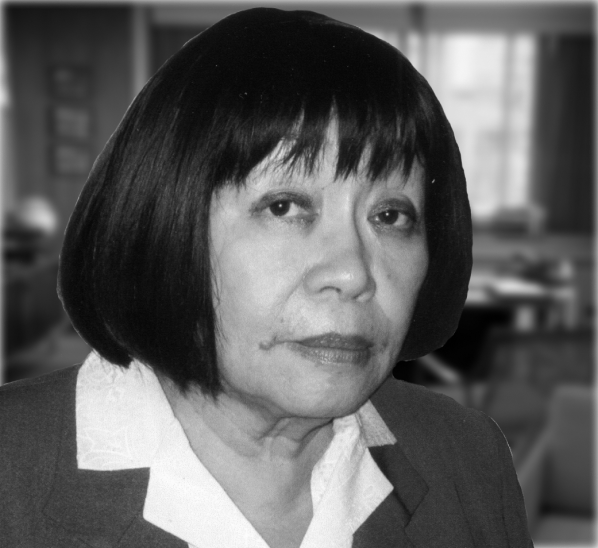Democracy has deep roots in the Philippines, yet its authority continues to be tested. Years of dictatorship, graft in high places, and the corruption of the electoral process by “goons, guns, and gold” have left many Filipinos cynical not only about democracy but about government itself-all the more so because government seems repeatedly to fall short of its promises and goals. In such a climate, serving in government can be thankless. Yet, HAYDEE YORAC, a lawyer and professor of law, has repeatedly answered the call to serve. In doing so, she has confounded the cynics and shown that even the most intractable problems can yield to solutions if they are attacked honestly and with vigor.
HAYDEE YORAC hails from a small Visayan town where her father was mayor and her mother taught school. She moved on to the University of the Philippines and its College of Law and passed the bar in 1963. As a young law instructor at her alma mater, she became politically active and opposed the Vietnam War. When Ferdinand Marcos declared martial law, she was jailed for over three months and, afterwards, moved to the forefront of the legal fight to restore democracy. People came to know her as outspoken, incorruptible, and fearless.
After the People Power Revolution, YORAC served seven years as a national election commissioner, organizing elections in contested, far-flung areas of the country and lending her considerable reputation to the hopeful project of restoring integrity to the country’s electoral process. As chair of the National Unification Commission in 1992 and 1993, she met face-to-face with the government?s armed opponents and astutely identified grounds for negotiation and peace; her commission’s insightful report became a trusted blueprint for the country’s peace process. YORAC then shifted to private practice until, in 2001, she was named chair of the Presidential Commission on Good Government, or PCGG.
In 1986, President Corazon Aquino created the PCGG in her very first executive order. Its mandate was to restore to the Philippines vast amounts of wealth stolen by Marcos and his family and friends. This was a difficult task. The commission launched case after case and the years passed. By the time YORAC was named its eleventh chair, it had recovered only two billion out of an estimated ten billion U.S. dollars of the Marcos hoard. Many people said that the PCGG was on a fool’s errand. YORAC proved them wrong.
Advancing on all fronts, she strengthened the commission’s staff with talented young lawyers. She cultivated good working relations with the commission’s collaborating agencies. She brought order to its chaotic files, computerizing them for the first time. And she stoked the fires under hundreds of stalled cases and long-running legal battles.
Stunning victories followed. On her watch, the PCGG recovered for the national treasury U.S.$683 million from Marcos’s Swiss bank accounts. It also secured court decisions favorable to the government regarding shares worth billions of pesos in the United Coconut Planters Bank and San Miguel Corporation. These are the commission’s largest gains since its establishment, a boon both for the Philippine agrarian reform program and, not incidentally, for the country’s faith in justice.
Even so, many hundreds of PCGG cases remain unresolved. YORAC continues to move them through the courts impatiently. Slowed by recent illnesses, the feisty, sixty-three-year-old Yorac has had to work from her sickbed. She knows she will not complete the task herself. Others will rise to it. “No one is indispensable,” she reminds us all. “Making a difference is enough.”
In electing HAYDEE YORAC to receive the 2004 Ramon Magsaysay Award for Government Service, the board of trustees recognizes her building confidence in government through service of exceptional integrity and rigor and her unwavering pursuit of the rule of law in the Philippines.
Chairman and Trustees of the Ramon Magsaysay Award Foundation Distinguished Guests, Fellow Awardees and Dear Friends.
I would like to thank the Ramon Magsaysay Award Foundation and those who have taken part in the selection process for bestowing this honor upon me. I feel humbled by this recognition because I know I did not do it alone. There are so many other unsung public servants who have made their respective contributions in making the public office truly a public trust.
Our values and personal convictions dictate the direction that we take and the stand that we make on moral issues that affect our work, in particular, and the country, in general. The desire to make government more effective and efficient in its mandate of good governance is of paramount importance. It is the driving force that compels many of us to accept responsibilities in government, despite the odds.
In the Philippines, the odds are made even more formidable by our experience of a dictatorship that ravaged our economy and shattered the morale of our people. Twenty years takes a long time to undo and, sometimes, it can really be frustrating! However, I have been favored with the support of well-meaning individuals and groups in this endeavor. Together we have tried to do our best in regaining the public’s trust in government.
The task is by no means completed; the goal is not yet reached. We continue to try and do our best and leave the rest in God’s hands. Thank you and good evening.

